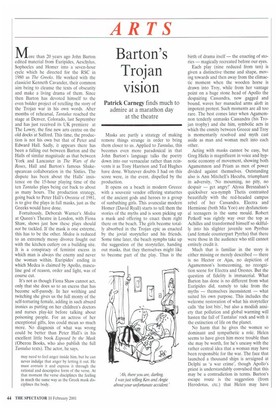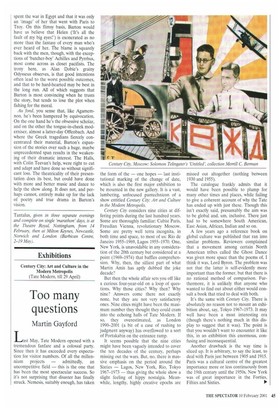Barton's Trojan vision
Patrick Carnegy finds much to admire at a marathon day at the theatre
More than 20 years ago John Barton edited material from Euripides, Aeschylus, Sophocles and Homer into a seven-hour cycle which he directed for the RSC in 1980 as The Greeks. He worked with the classicist Kenneth Cavander, their common aim being to cleanse the texts of obscurity and make a living drama of them. Since then Barton has devoted himself to the even bolder project of retelling the story of the Trojan war in his own words. After months of rehearsal, Tantalus reached the stage at Denver, Colorado, last September and has just received its UK premiere at The Lowry, the fine new arts centre on the old docks at Salford. This time, the production is not his own but that of Peter and Edward Hall. Sadly, it appears there has been a falling out between Barton and the Halls of similar magnitude as that between York and Lancaster in The Wars of the Roses, Hall and Barton's famous Shakespearean collaboration in the Sixties. The dispute has been about the Halls' insistence on the 15-hour playing time of the ten Tantalus plays being cut back to about as many hours. The production strategy, going back to Peter Hall's Oresteia of 1981, is to give the plays in full masks, just as the Greeks would have done.
Fortuitously, Deborah Warner's Medea at Queen's Theatre in London, with Fiona Shaw, shows just how these plays should not be tackled. If the mask is one extreme, this has to be the other. Medea is reduced to an extremely messy divorce fought out with the kitchen cutlery on a building site. It is a conspiracy of feminist excess in which man is always the enemy and never the woman within. Euripides' ending in which Medea is claimed by Apollo, masculine god of reason, order and light, was of course cut.
It's not as though Fiona Shaw cannot act, only that she does so to an excess that has become self-parody. In her writhing and twitching she gives us the full monty of the self-torturing female, adding in such absurd ironies as putting on her children's doctors and nurses play-kit before talking about poisoning people. For an actress of her exceptional gifts, less could mean so much more. No diagnosis of what was wrong could be better than Peter Hall's in his excellent little book Exposed by the Mask (Oberon Books, who also publish the full Tantalus texts). The actor, he says,
may need to feel anger inside him, but he can never indulge that anger by letting it out. He must contain it and express it through the rational and descriptive form of the verse. At that moment the verse disciplines the feeling in much the same way as the Greek mask disciplines the body.
Masks are partly a strategy of making remote things strange in order to bring them closer to us. Applied to Tantalus, this becomes even more paradoxical in that John Barton's language talks the poetry down into our vernacular rather than reinvents it as Tony Harrison and Ted Hughes have done. Whatever doubts I had on this score were, in the event, dispelled by the production.
It opens on a beach in modern Greece with a souvenir vendor offering statuettes of the ancient gods and heroes to a group of sunbathing girls. This avuncular modern Homer (David Ryall) starts to tell them the stories of the myths and is soon picking up a mask and offering to enact them right there on the beach. The girls become totally absorbed in the Trojan epic as enacted by the jovial storyteller and his friends. Some time later, the beach nymphs take up the suggestion of the storyteller, handing out masks, that they themselves might like to become part of the play. Thus is the birth of drama itself — the enacting of stories — magically recreated before our eyes.
Each play (nine reduced from ten) is given a distinctive theme and shape, moving towards and then away from the climactic moment when the wooden horse is drawn into Troy, while from her vantage point on a huge stone head of Apollo the despairing Cassandra, now gagged and bound, waves her manacled arms aloft in impotent protest. Such moments are all too rare. The best comes later when Agamemnon tenderly unmasks Cassandra (his Trojan trophy) and she him, symbolic acts in which the enmity between Greece and Troy is momentarily resolved and myth cast aside as man and woman melt into each other.
Acting with masks cannot be easy, but Greg Hicks is magnificent in voice and hypnotic economy of movement, showing both Agamemnon and Priam as men of power divided against themselves. Outstanding also is Ann Mitchell's Hecuba, triumphant in adversity. 'No mourning, no pity, no despair — get angry!' Alyssa Bresnahan's quicksilver sea-nymph Thetis contrasted beautifully with the red-headed campus rebel of her Cassandra. Electra and Hermione (both Mia Yoo) are dysfunctional teenagers in the same mould. Robert Petkoff was rightly way over the top as Achilles and transformed himself so skilfully into his slighter juvenile son Pyrrhus (and female counterpart Pyrrha) that there were those in the audience who still cannot entirely credit it.
Much that is familiar in the story is either missing or merely described — there is no Hector or Ajax, no depiction of Agamemnon's homecoming, no recognition scene for Electra and Orestes. But the question of fidelity is immaterial. What Barton has done is no different from what Euripides did, namely to take from the myths — themselves inconsistent — what suited his own purpose. This includes the welcome restoration of what his storyteller calls 'the lost bits', but also a modish anxiety that pollution and global warming will hasten the fall of Tantalus' rock and with it the extinction of life on the planet.
No harm that he gives the women so dominant and sympathetic a role. Helen seems to have given him more trouble than she may be worth, for he's uneasy with the rather central idea that a woman may have been responsible for the war. The face that launched a thousand ships is arraigned at Delphi as 'a war crime', though Apollo's priest is understandably convulsed that this may be a contradiction in terms. Barton's escape route is the suggestion (from Herodotus, etc.) that Helen may have spent the war in Egypt and that it was only an 'image' of her that went with Paris to Troy. On this flimsy basis, Barton would have us believe that Helen (It's all the fault of my big eyes!') is exonerated as no more than the fantasy of every man who's ever heard of her. The blame is squarely back with the men, though, with the exceptions of 'butcher-boy' Achilles and Pyrrhus, most come across as closet pacifists. The irony here, as Alan Dobie's grainy Odysseus observes, is that good intentions often lead to the worst possible outcomes, and that to be hard-hearted may be best in the long run. All of which suggests that Barton is most convincing when he trusts the story, but tends to lose the plot when fishing for the moral.
Au fond, you sense that, like Agamemnon, he's been hampered by equivocation. On the one hand he's the obsessive scholar, and on the other the tongue-in-cheek moderniser, almost a latter-day Offenbach. And where the Greek tragedians fiercely concentrated their material, Barton's expansion of the stories over such a huge, maybe unprecedented span results in the weakening of their dramatic interest. The Halls, with Colin Teevan's help, were right to cut and adapt and have done so without significant loss. The theatricality of their presentation does its best, but could have done with more and better music and dance to help the show along. It does not, and perhaps cannot, entirely make up for the lack of poetry and true drama in Barton's vision.
Tantalus, given in three separate evenings and complete on single Marathon' days, is at the Theatre Royal, Nottingham, from 14 Febntaty, then at Milton Keynes, Newcastle. Norwich and London (Barbican Centre, 2-19 May),



































































 Previous page
Previous page